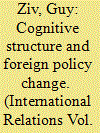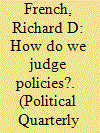| Srl | Item |
| 1 |
ID:
110845


|
|
|
|
|
| Publication |
2011.
|
| Summary/Abstract |
Rationalist explanations of foreign policy change are underdetermined because they overlook the decision-makers themselves. Insight from cognitive psychology shows that individuals' cognitive structures provide a useful lens through which to understand why some people are more likely than others to change their core beliefs. Two related cognitive variables - cognitive openness and cognitive complexity - hold promise for enhancing extant explanations of foreign policy change. This article assesses the cognitive structure of the three leaders who dominated Israeli decision-making in the decade leading up to Israel's dramatic policy change vis-à-vis the PLO in 1993: Yitzhak Shamir, Yitzhak Rabin and Shimon Peres. The article demonstrates that Peres, who is found to be the most cognitively open and complex, was quicker to embrace a dialogue with the PLO than Rabin, while Shamir, who is found to hold the lowest levels of openness and complexity, rejected this move altogether. Peres, and to a lesser extent Rabin, proved to be more sensitive to international, regional and domestic changes than Shamir. This case illustrates that systemic-structural and domestic political factors are necessary, but insufficient, conditions for foreign policy change. The levels of decision-makers' cognitive openness and complexity are key to determining the likelihood that they will change their beliefs on a core policy issue that can, in turn, lead to foreign policy change. This article thus contributes to our understanding of both foreign policy change and the process leading up to the historic 1993 agreement between Israel and the PLO.
|
|
|
|
|
|
|
|
|
|
|
|
|
|
|
|
| 2 |
ID:
130947


|
|
|
|
|
| Publication |
2014.
|
| Summary/Abstract |
Political science has paid scant attention to the way that citizens judge public policy, assuming that citizens do so, or should do so, in ways familiar to academics themselves, depending upon which of the various schools of thought they endorse. This paper argues that approaching citizens' judgement realistically requires attention to political psychology. Indeed, our conception of citizen judgement can be enriched by attention to research and theory in cognitive psychology and neuroscience. That work emphasises that much judgement occurs spontaneously and very rapidly, that it is involuntary and non-semantic and that it depends upon the emotional impact of experience rather than conscious weighing of situations against explicit standards of assessment such as science, self-interest or moral theory. A moral psychology for public life is sketched out, with implications for judgment by politicians.
|
|
|
|
|
|
|
|
|
|
|
|
|
|
|
|